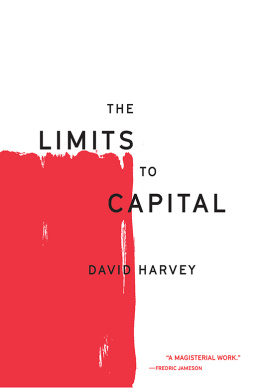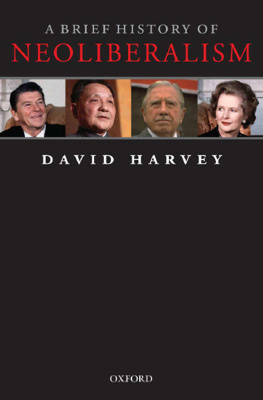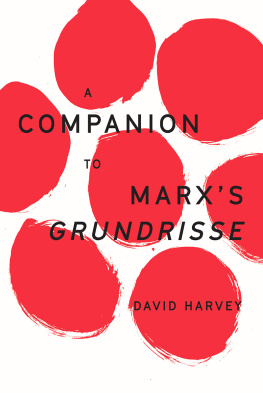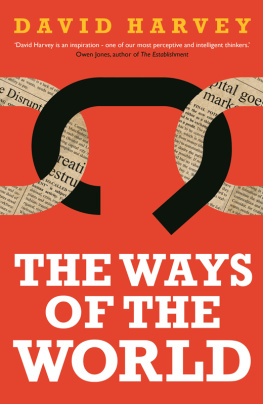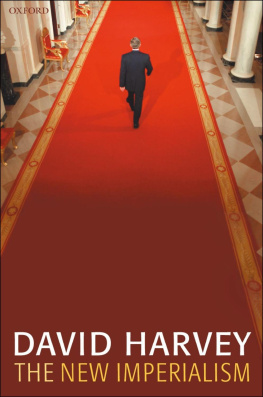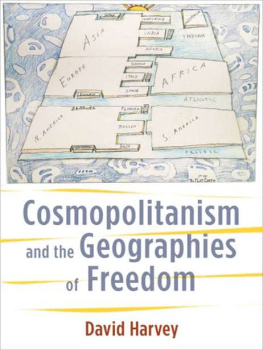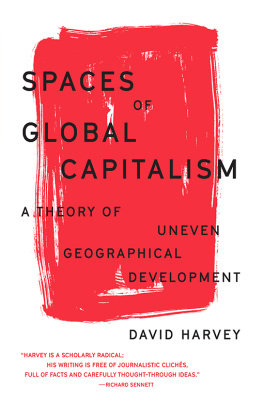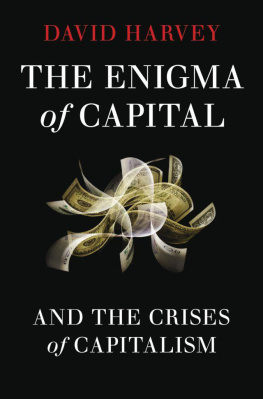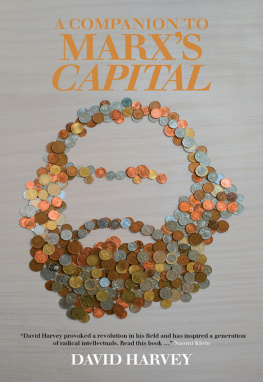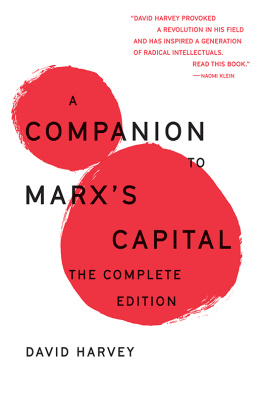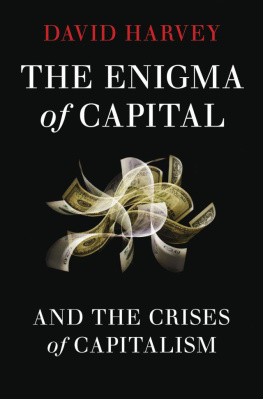Contents

The Limits to Capital
The Limits
to
Capital
DAVID HARVEY

This edition published by Verso 2018
Published by Verso 1999, 2006
First published by Basil Blackwell, Oxford, 1982
David Harvey 1982, 1999, 2006, 2018
All rights reserved
The moral rights of the author have been asserted
1 3 5 7 9 10 8 6 4 2
Verso
UK: 6 Meard Street, London W1F 0EG
US: 20 Jay Street, Suite 1010, Brooklyn, NY 11201
versobooks.com
Verso is the imprint of New Left Books
ISBN-13: 978-1-78873-101-0
ISBN-13: 978-1-78873-103-4 (UK EBK)
ISBN-13: 978-1-78873-102-7 (US EBK)
British Library Cataloguing in Publication Data
A catalogue record for this book is available from the British Library
Library of Congress Cataloging-in-Publication Data
A catalog record for this book is available from the Library of Congress
Printed and bound by CPI Group (UK) Ltd, Croydon, CR0 4YY
Contents
The Limits to Capital was written in an attempt to make Marxs political-economic thought more accessible and more relevant to the specific problems of the time. The time was the 1970s when words like globalization, financial derivatives, and hedge funds were not part of our vocabulary, when the euro and organizations such as the WTO and NAFTA were mere daydreams and when organized labour and substantively (as opposed to nominally) left political parties still strongly influenced politics within the seemingly solid framework of particular nation states. Limits was written before Thatcher and Reagan came to power, before China began its astonishing surge of capitalistic development, before the financialization ofeverything seemed normal, before outsourcing and global capital mobility had seriously begun to challenge the sovereign powers of nation states to regulate certain aspects of their own affairs. It was written when the capitalist class assault against working-class power, the welfare state and all forms of state regulation was incipient and patchy rather than accomplished and widely diffused. It was also written well before the end of the Cold War, the marketization of formerly Communist economies, the general discrediting of Communism, and the widespread rejection of Keynesian theories of social-democratic state interventionism. It was, in short, written before the neoliberal counter-revolution had taken hold.
Limits turns out, however, to have been a prescient text. In some respects it is even more relevant now because it charts a theoretical way to come to grips with the contradictions inherent in how a neoliberalizing capitalism works. Its contemporary relevance arises for a number of reasons. First, Marxs major works in political economy took the form of a critique of classical liberal theory (Adam Smith and Ricardo in particular). This critical method applies equally to a free-market neoliberalism that mainly derives from eighteenth-century liberalism modified according to the precepts of neo-classical economics (which abandoned the labour theory of value in favour of marginalist principles, paving the way for endless elaborations of the theory of how markets work). Marxs critical apparatus is far more applicable to neoliberalism than it was to the embedded liberalism and Keynesianism that dominated in the advanced capitalist world up until the mid-1970s.
The second reason arose rather fortuitously. In order to understand the urban processes that were then the immediate focus of my interest, I needed to expand upon some of Marxs undeveloped categories. Fixed capital (particularly that embedded in built environments), finance, credit, rent, space relations and state expenditures all had to be brought together in such a way as to better comprehend urban processes, property markets and uneven geographical developments. The theoretical apparatus that emerged from this was well-suited to confront the dramatic general changes that subsequently occurred. I had, it turned out, constructed a robust theoretical foundation for the critical exploration of what a finance-led process of globalization might be all about. Limits was and continues to be the only text I know that seeks to integrate the financial (temporal) and geographical (global and spatial) aspects to accumulation within the overall framework of Marxs argument in a holistic and dialectical rather than segmented and analytical way. It provides a systematic link between the underlying theory (for which there are many excellent and competing expositions) and the expression of those forces on the ground.
The third reason is more directly political. The 1970s were troubled years. The global crisis of capital accumulation then unfolding was the worst since the 1930s. The strong state interventionism that had prevailed in most of the advanced capitalist countries after 1945 and delivered high rates of growth was in difficulty. The oil embargo subsequent to the Arab-Israeli war in 1973 masked the onset of recession and posed the problem of how the petrodollars flowing into the Gulf States were going to be recycled into the global economy through the financial system. Property crashes worldwide and the simultaneous collapse of several financial institutions in early 1973, coupled with the unravelling of the international Bretton Woods financial arrangements posed perplexing problems. Financial deregulation and budgetary austerity were already being touted as solutions (particularly in the US with an urban event the fiscal disciplining of New York City in 1975 leading the way). The UK was disciplined by the International Monetary Fund in 1975-6 and Chile went neoliberal in the wake of Pinochets coup against Allende in 1973. Labour unrest was everywhere rampant and political movements of the Left were gaining ground both in Europe as well as in many areas of the developing world. Even in the United States the combination of an anti-war movement, a civil rights movement and a student movement was roiling the political system and threatening political-economic elites and corporate and state legitimacy. There was, in short, a generalized crisis of capital accumulation coupled with a serious challenge to capitalist class power.
The solutions that emerged victorious (though very unevenly) from the confusions of the 1970s were broadly along neoliberal, or so-called free-market lines, in which finance capital (in part because of the petrodollar problem) led the way. This victory was by no means inevitable and, as is now becoming abundantly clear, is not without its own internal contradictions and instabilities, both political and economic. But one consequence of neoliberalization has been all too predictable. In volume 1 of Capital, Marx shows that the closer a society conforms to a deregulated, free-market economy, the more the asymmetry of power between those who own and those excluded from ownership of the means of production will produce an accumulation of wealth at one pole and an accumulation of misery, agony of toil, slavery, ignorance, brutality, mental degradation, at the opposite pole (Capital, vol. 1, p. 645). Three decades of neoliber-alization have produced precisely such an unequal outcome. A plausible argument can be constructed, as I sought to show in A Brief History of Neoliberalism, that this was what the neoliberalizing agenda of leading factions of the capitalist class was about from the very outset. Elite elements of the capitalist class emerged from the turmoil of the 1970s having restored, consolidated and in some instances reconstituted their power worldwide.

